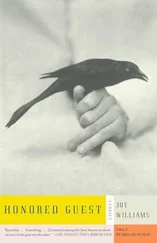The clock tocks. One can even hear it in the kitchen, where I go immediately. The refrigerator is full of remains — fatted, wilted, jellied and iced. Dishes covered with waxed paper and cinched with a rubber band. I quickly remove some and start spooning the contents into my mouth. The food seems harmless enough and bland. I drink Ruttkin’s quart of milk too even though it would not be irrational of me to dump it down the sink or commit some terrible crime on it … as a gesture.
But I eat and I drink Ruttkin’s milk, for I’ve been taught it’s a sin to waste the food that prolongs life. What with all the starving bodies, I’ve learned to use everything up.
My radio is in its ordered corner beside my bed but someone has been using it. There’s wax on the plugs. I turn it on right away. There is my old chum, my answer man on “Action Line,” with the voice I’ve left him with. He is saying, “I am sorry, we do not accept solicitations. We only take questions offered in good faith and taste.” I cradle the radio to my cheek. There is nothing for me to think about and I’ll tell you, even when I could, I would never think about those woods we’ve left now. I couldn’t understand them and I couldn’t understand the people and the animals that came into them. When Grady was away at school, I spent hours in utter solitude and didn’t learn a thing. At first I was alarmed, but then I realized that it was what I wanted all the time. My life was slowing down. Nothing was feeding it any more. It was draining like a wound and there was a possibility that soon I might experience true freedom.
Indeed, even now I have hopes that my only opportunities will be those I’ll miss. I want to stall my life like a train on a track, perfectly midway, between what has happened and what is happening. First emission, then omission, that’s the key to life and our success can be measured by the purity and bleakness of the bone of our existence. As someone said, no one is going to kill you . No, no one’s going to kill you or even loathe or love you. Though this is not quite true, for we’re told it has happened to some. Not us certainly but to some, people that we know.
Omit, omit and one day you will be down to a funny, white and quite lifeless seed. I see it as a sort of heart of palm myself. In the groceries, they sell them in tins at outrageous prices. In New York restaurants, I hear, they do the same. Actually the stuff is swamp cabbage, easily hacked from an ugly and useless weed that covers the ground of the South, common as pennies. But we’re all game and gullible as tourists in this life. No one is able to tell us anything. The soul is a heart of palm and living is a messy salad with everything in it being similar but less interesting, less necessary as you proceed. The trick is not ignoring this discovery after you’ve made it. Do not be a polite guest .
What is a lost soul? It is
one that has turned from its
true path and is groping in
the darkness of remembered ways—
Malcolm Lowry
THE CONGREGATION was the town and the town made up the island. The cold was convivial to their natures but before the Reverend had come they had never been instructed in the bitter ways of God. It was true that once, before the Reverend took up his duties, there had been a suicide among them. Mr. Pardee cut his throat with an oyster knife. Mrs. Pardee, who was only seventeen at the time, was making cheese and refused to attend to anything else before the cheese was completed. This was an enviable trait exhibited and one which, all conditions being equal, everyone in town would have been proud to show themselves. Since that time, nothing more occurred — one dusk as they were out cutting greens for the Christmas mantels, each noticed the other had become middle-aged or worse.
Then the Reverend came and after a few years it appeared that God had found the island again, in the manner of putting a bad hand down upon it. When it appeared that the hand had come to rest on the Reverend’s little family, the people came to the conclusion, without being aware that they had reached it, that the distribution of pain, at least on this tiny place, on this doggerel rock adrift in the sea, was as just as man could expect, because the man and the lone peculiar little child could bear it best. They handled it not only impassively but gracefully. It was almost their style. It was the mother who had always been wasted by it, who threw herself on grief’s mercy. And of course now she was gone. There was the lesson. Everything exists to teach. Her haunted manner, her aching ways gone, at peace the frenzy she had shown in the last months … The Reverend was a difficult man, an exacting man. Perhaps he never should have married … but who could say? Needs are forgotten. Arrangements rearranged. Now he is alone, a father with the little Kate. Such a discomfiting child. There’s something lame about her, something dark. There is the air of a sanctified crime about her — of a holy slattern. But she is only a child! She has the boniness of a child, the tiny features — they could be put in a cup. Heartbreak surrounds her, though she seems unaware of it. She moves through it like a leaf, like a feather, like a falling piece of soot. It is as though she is living out some event that is not part of her life. The townspeople, however, would not think of this. How could they? They live in the faltered rhythm and dip of the island. They listen to the telephone. Nothing happens here. The town has no possibilities and this is the only child now. The wombs are barren, the land cannot bear. They swim in conjecture, the time and the tides.
But how will the father and the little girl live now? The child seems an orphan, a ward of something vast and troubling. Of course they will remain here, she will go to school. The townspeople expect that the Reverend will continue to instruct her. Already she has developed great skill at recitation and vaguely terrorizes them, being able to recite long sections of the Bible with a dreamy and demonic exactitude, translating the sounds into something privately understood and then returning them to rote, to a maddeningly void and childish lilt. It’s almost heresy for her to prattle so, so unmindful, the words so clear and useless like a mirror hung backward on a wall. She reflects nothing but her father. He is in her eyes, the way she holds her hands. Perhaps it is simply a stage the child is going through. They know nothing about children. The sister had playmates who would come from the mainland, who would tumble and yowl through the crisp black and white town, but now Kate is the solemn solitary child they must share and she has no friends who visit her. Even before the mother died, she was seen only in the company of the Reverend. At dusk each weekday, he would meet her at the ferry slip and they would go home together, flowing up the street, not speaking, her fingers in his big hands. The townspeople watch from their windows, eating bread and beans. They take an embarrassed delight in her inconsistencies, embarrassed because she is, after all a child, not yet seven years old, and they wish her no ill. She maintains that she takes no pleasure. That phrase. She has said it to almost all of them at one time or another when they wanted to give her a little something, make her a small and harmless present. And yet they have seen her eating ice cream. Tying ribbons in her hair. Climbing in the trees. In the winter she plays earnestly, skating, sledding, running with her dog. She obviously has rules, strict restrictions, self-imposed. The play is highly ritualized but it is play. Once the postman heard her singing …
Читать дальше












